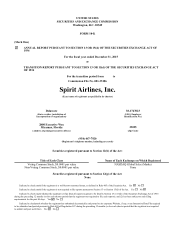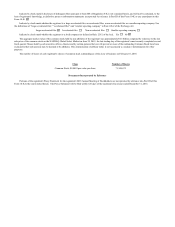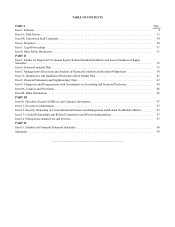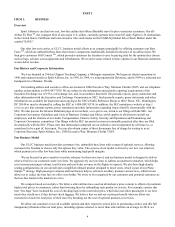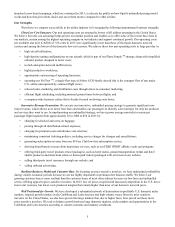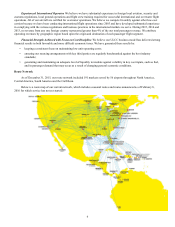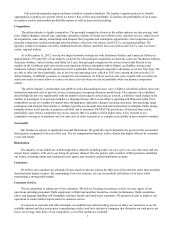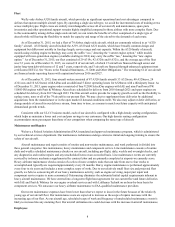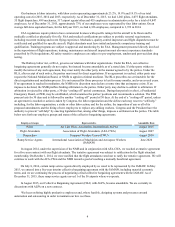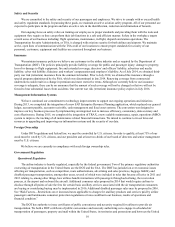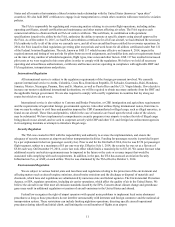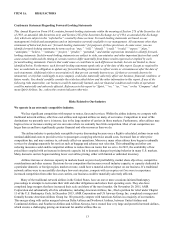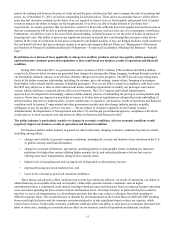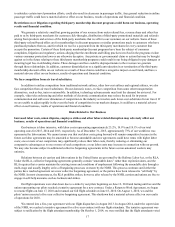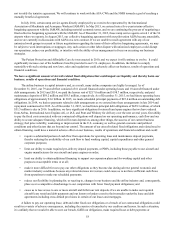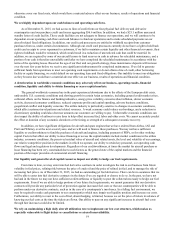Spirit Airlines 2015 Annual Report Download - page 11
Download and view the complete annual report
Please find page 11 of the 2015 Spirit Airlines annual report below. You can navigate through the pages in the report by either clicking on the pages listed below, or by using the keyword search tool below to find specific information within the annual report.11
States and all countries that maintain a liberal aviation trade relationship with the United States (known as “open skies”
countries). We also hold DOT certificates to engage in air transportation to certain other countries with more restrictive aviation
policies.
The FAA is responsible for regulating and overseeing matters relating to air carrier flight operations, including airline
operating certificates, aircraft certification and maintenance and other matters affecting air safety. The FAA requires each
commercial airline to obtain and hold an FAA air carrier certificate. This certificate, in combination with operations
specifications issued to the airline by the FAA, authorizes the airline to operate at specific airports using aircraft approved by
the FAA. As of December 31, 2015, we had FAA airworthiness certificates for all of our aircraft, we had obtained the necessary
FAA authority to fly to all of the cities we currently serve, and all of our aircraft had been certified for overwater operations. In
2014, the FAA issued its final regulations governing pilot rest periods and work hours for all airlines certificated under Part 121
of the Federal Aviation Regulations. The rule, known as FAR 117 which became effective on January 4, 2014, impacts the
required amount and timing of rest periods for pilots between work assignments, and modifies duty and rest requirements based
on the time of day, number of scheduled segments, flight types, time zones and other factors. FAR 117 has resulted in increased
pilot costs as we were required to hire more pilots in order to comply with the regulations. We believe we hold all necessary
operating and airworthiness authorizations, certificates and licenses and are operating in compliance with applicable DOT and
FAA regulations, interpretations and policies.
International Regulation
All international service is subject to the regulatory requirements of the foreign government involved. We currently
operate international service to Aruba, Colombia, Costa Rica, Dominican Republic, El Salvador, Guatemala, Haiti, Honduras,
Jamaica, Mexico, Nicaragua, Panama, Peru and St. Maarten, as well as Puerto Rico and the U.S. Virgin Islands. If we decide to
increase our routes to additional international destinations, we will be required to obtain necessary authority from the DOT and
the applicable foreign government. We are also required to comply with overfly regulations in countries that lay along our
routes but which we do not serve.
International service is also subject to Customs and Border Protection, or CBP, immigration and agriculture requirements
and the requirements of equivalent foreign governmental agencies. Like other airlines flying international routes, from time to
time we may be subject to civil fines and penalties imposed by CBP if unmanifested or illegal cargo, such as illegal narcotics, is
found on our aircraft. These fines and penalties, which in the case of narcotics are based upon the retail value of the seizure,
may be substantial. We have implemented a comprehensive security program at our airports to reduce the risk of illegal cargo
being placed on our aircraft, and we seek to cooperate actively with CBP and other U.S. and foreign law enforcement agencies
in investigating incidents or attempts to introduce illegal cargo.
Security Regulation
The TSA was created in 2001 with the responsibility and authority to oversee the implementation, and ensure the
adequacy of security measures at airports and other transportation facilities. Funding for passenger security is provided in part
by a per enplanement ticket tax (passenger security fee). Prior to and for the first half of 2014, this fee was $2.50 per passenger
flight segment, subject to a maximum of $5 per one-way trip. Effective July 1, 2014, the security fee was set at a flat rate of
$5.60 each way. On December 19, 2014, a new law took effect which limits a round-trip fee to $11.20. We cannot forecast what
additional security and safety requirements may be imposed in the future or the costs or revenue impact that would be
associated with complying with such requirements. In addition, in the past, the TSA has assessed an Aviation Security
Infrastructure Fee, or ASIF, on each airline. This fee was eliminated by the TSA effective October 1, 2014.
Environmental Regulation
We are subject to various federal, state and local laws and regulations relating to the protection of the environment and
affecting matters such as aircraft engine emissions, aircraft noise emissions and the discharge or disposal of materials and
chemicals, which laws and regulations are administered by numerous state and federal agencies. The Environmental Protection
Agency, or EPA, regulates operations, including air carrier operations, which affect the quality of air in the United States. We
believe the aircraft in our fleet meet all emission standards issued by the EPA. Concern about climate change and greenhouse
gases may result in additional regulation or taxation of aircraft emissions in the United States and abroad.
Federal law recognizes the right of airport operators with special noise problems to implement local noise abatement
procedures so long as those procedures do not interfere unreasonably with interstate and foreign commerce and the national air
transportation system. These restrictions can include limiting nighttime operations, directing specific aircraft operational
procedures during takeoff and initial climb, and limiting the overall number of flights at an airport.

